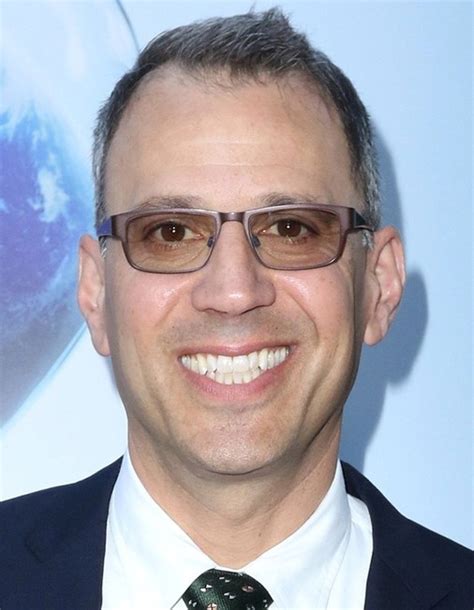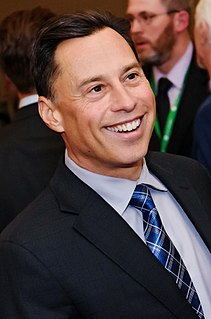Top 828 Profits Quotes & Sayings - Page 14
Explore popular Profits quotes.
Last updated on November 25, 2024.
I wish that Google would realize its own power in the cause of free speech. The debate has been often held about Google's role in acceding to the Chinese government's demands to censor search results. Google says that it is better to have a hampered internet than no internet at all. I believe that if the Chinese people were threatened with no Google, they might even rise up and demand free speech - free search and links - from their regime. Google lives and profits by free speech and must use its considerable power to become a better guardian of it.
We make movies about remarkable people like President Mohamed Nasheed of the Maldives in "The Island President" and Al Gore in the film, who get up every day and are driven in an almost inhuman way to make a change in a problem that they see in the world and shine truth into a very dark arena where bad actors try to lie to the American public to gain profits for fossil fuel companies. To us, that's a natural drama. And that's primarily where we work - character-based films that we hope will bring issues to life through their stories.
Books are special, books are the way we talk to generations that have not turned up yet. The fact that we can actually, essentially communicate with the people in ancient Egypt, people in Rome and Greece, people in ancient Britain, people in New York in the 1920s who can communicate to us and change the way we think, and change the things that we believe. I think that books are special. Books are sacred. And I think that when you are selling books, you have to remember that in all the profits and loss, in all of that, you are treading on sacred ground.
In 1990, about 1 percent of American corporate profits were taken in tax havens like the Cayman Islands. By 2002, it was up to 17 percent, and it'll be up to 20-25 percent very quickly. It's a major problem. Fundamentally, we have a tax system designed for a national, industrial, wage economy, which is what we had in the early 1900s. We now live in a global, asset-based, services world. And we need to have a tax system that follows the economic order or it's going to interfere with economic growth, it's going to reduce people's incomes, and it's going to damage the US.
The war on drugs was never meant to be won. Instead, it will be prolonged as long as possible in order to allow various intelligence operations to wring the last few hundreds of millions of dollars in illicit profits from the global drug scam; then defeat will have to be declared. "Defeat" will mean, as it did in the case of the Vietnam War, that the media will correctly portray the true dimensions of the situation and the real players, and that public revulsion at the culpability, stupidity and venality of the Establishment's role will force a policy review.
We honor ambition, we reward greed, we celebrate materialism, we worship acquisitiveness, we commercialize art, we cherish success and then we bark at the young about the gentle arts of the spirit. The kids know that if we really valued learning, we would pay our teachers what we pay our lawyers and stockbrokers. If we valued art, we would not measure it by its capacity to produce profits. If we regarded literature as important, we would remove it from the celebrity sweepstakes and spend a little money on our libraries.
In this very uncertain time for the media, serious investigative reporting - the expensive, time-consuming stuff - is under enormous pressure at newspapers and other commercial news organizations. Non-profits such as the Center for Public Integrity are taking on this vital work and without them the prospects for investigative reporting would be even more dire. The Center has been properly celebrated for its careful, rigorous work, and to my mind it has now ascended to the status of national treasure.
This morning, prompted by increasing concerns about terrorism, oil prices reached a record high as the cost of a barrel of crude is a whopping $44.34. Wow, it seems shocking that a product of finite supply gets more expensive the more we use it. Now the terror alert means higher oil prices, which oddly enough means higher profits for oil companies giving them more money to give to politicians whose policies may favor the oil companies such as raising the terror alert level. As Simba once told us: "It's the circle of life."
In raising the price of commodities, the rise of wages operates in the same manner as simple interest does in the accumulation of debt. Our merchants and master manufacturers complain much of the bad effects of high wages in raising the price, and thereby lessening the sale of their goods, both at home and abroad. They say nothing concerning the bad effects of high profits; they are silent with regard to the pernicious effects of their own gains. They complain only of those of other people.
It's more about subtracting every single buck from the tourists that still flock there. Gentrification and the need for developers to maximize their profits from every square inch of the place means that there just aren't any scruffy little basement clubs left. Those scruffy little basement clubs were the areas lifeblood. Now, it's all penthouse flats and global brands. They destroyed the very thing that drew people there in the first place - it's superficial sleaziness.
One of our great strength, world capitalism, is the most successful economic system possible, but has also become one of shorter and shorter cycles of evaluation. CEOs, companies, stocks, profits and debits change at an ever more accelerated pace in response to the demands of stockholders and the market. We have already experienced some consequences of the shortening cycle of decision making in business, but those are minor in relation to the grand systemic collapse that always eventually results from such accelerating and shortening periods for leadership goals.
I run my company according to feminine principles, principles of caring, making intuitive decisions, not getting hung up on hierarchy or all those dreadfully boring business-school management ideas; having a sense of work as being part of your life, not separate from it; putting your labor where your love is; being responsible to the world in how you use your profits; recognizing the bottom line should stay at the bottom.
One, which I mention several times elsewhere, is the need for patience if big profits are to be made from investment. Put another way, it is often easier to tell what will happen to the price of a stock than how much time will elapse before it happens. The other is the inherently deceptive nature of the stock market. Doing what everybody else is doing at the moment, and therefore what you have an almost irresistible urge to do, is often the wrong thing to do at all.
The prospect of penury in age is so gloomy and terrifying that every man who looks before him must resolve to avoid it; and it must be avoided generally by the science of sparing. For, though in every age there are some who, by bold adventures, or by favorable accidents, rise suddenly to riches, yet it is dangerous to indulge hopes of such rare events; and the bulk of mankind must owe their affluence to small and gradual profits, below which their expense must be resolutely reduced.
When Wal-Mart brings water down to the Katrina victims, it's not doing that to be nice; it's doing it to make larger profits and to increase the value of its shares. If its actions are not accomplishing those objectives, the shareholders can sue the executives, and sue them successfully, because it is illegal for them to act on behalf of any other reason than increasing the value of their shares. There is nothing wrong with that. That is the way that they were created and the way we want them to function to increase prosperity in the market.
I don't think that Mitt Romney can legitimately say that he learned anything about how to create jobs in the LBO (leveraged buyout) business. The LBO business is about how to strip cash out of old, long-in-the-tooth companies and how to make short-term profits. All the jobs that he talks about came from Staples. That was a very early venture stage deal. That, you know they got out of long before it got to its current size.
I have come to believe over and over again that what is most important to me must be spoken, made verbal and shared, even at the risk of having it bruised or misunderstood. That the speaking profits me, beyond any other effect....what I most regretted were my silences. Of what had I ever been afraid? ...Death on the other hand, is the final silence...my silences had not protected me. Your silences will not protect you.
Over the years, I developed an extreme hostility towards the non-profit art organization gulag. I formed the opinion that it's actually a very sophisticated form of government suppression of creativity, particularly in young people. When I see the younger generation dragged into this and being told to write these statements and take these photos, define your work this way or that way, I think it's wrong. I think instead of paying any attention to politics, a great project for young artists is to attack and destroy the non-profits of our world.
I think corporations should give more attention to this suffering and should wait to invest until there is a responsible government in Burma. I do not think it is a good idea to separate economics from politics; in fact, I do not think economics can be separated from politics It's quite understandable that many business concerns think only about their own profits It's up to the public to put as much pressure as it can on these companies, through shareholder resolutions and public actions.
When the Kerner Commission told white America what black America has always known, that prejudice and hatred built the nation’s slums, maintains them and profits by them, white America could not believe it. But it is true. Unless we start to fight and defeat the enemies in our own country, poverty and racism, and make our talk of equality and opportunity ring true, we are exposed in the eyes of the world as hypocrites when we talk about making people free - (Chapter 9).
The British use a system where the profits a corporation reports to shareholders is what they pay taxes on. Whereas in America we require corporations to keep two sets of books, one for shareholders and one for the IRS, and the IRS records are secret. For publicly-traded companies, the British system would tend to align the interests of the government with the interests of the company because the company wants to report the biggest possible profit. Though, all wealthy countries have high taxes as wealth requires lots of common goods, from clean water to public education to a justice system.
I am out of step with present conditions. When the game is no longer played your way, it is only human to say the new approach is all wrong, bound to lead to trouble, and so on. On one point, however, I am clear. I will not abandon a previous approach whose logic I understand ( although I find it difficult to apply ) even though it may mean foregoing large, and apparently easy, profits to embrace an approach which I don't fully understand, have not practiced successfully, and which possibly could lead to substantial permanent loss of capital.
The gift list is thinking upon His goodness – and this, this pleases Him most! And most profits my own soul and I am beginning, only beginning, to know it. If clinging to His goodness is the highest form of prayer, then this seeing His goodness with a pen, with a shutter, with a word of thanks, these really are the most sacred acts conceivable. The ones anyone can conceive, anywhere, in the midst of anything. Eucharisteo takes us into His love.
While big corporations make huge, tax-free profits, taxes for the everyday working person skyrocket. While politicians take free trips around the world, those same politicians cut back food stamps for the poor. While politicians increase their salaries, millions of people are being laid off. I do not understand a government so willing to spend millions of dollars on arms, to explore outer space, even the planet Jupiter, and at the same time close down day care centers and fire stations.
A permanent and sustainable solution to all the problems facing working people is possible by taking the biggest companies into democratic ownership, and reorganizing the economy on a democratically planned basis. Under such a system we could democratically decide how to allocate resources. We could rapidly transition away from fossil fuels, develop massive jobs programs to rebuild the country's rotting infrastructure, and begin to build a whole new world based on meeting the needs of the majority, not the profits of a few.
The goal of a private company is, first, zero to one. Get past the product market fit, figure out whether people actually care about what you're trying to build and someone will pay you money for that. That's the zero to one problem. So scaling, one through N, is figuring out can you do that at scale and how big is the scale. And when people pay you more than what it costs for you to make it, does that equation end up leaving you with money left over, i.e. profits.
Donald Trump needs to stay focused and remember the promises to you, the American people. You know the promises, repeal and replace Obamacare, identify radical Islam, lower taxes, repatriate corporate profits, build the border wall, appoint originalists to the Supreme Court, fix inner cities, energy independence, drain the swamp, send education back to the states, you know, say radical Islam, vet refugees, all of these important issues, free trade.
Remember, that money is of the prolific, generating nature. Money can beget money, and its offspring can beget more, and so on. Five shillings turned is six, turned again it is seven and threepence, and so on, till it becomes a hundred pounds. The more there is of it, the more it produces every turning, so that the profits rise quicker and quicker. He that kills a breeding sow, destroys all her offspring to the thousandth generation. He that murders a crown, destroys all that it might have produced, even scores of pounds.
God forbid that the United Kingdom should take a lead and introduce a sensible tax system of its own which would probably comprise a very low level of corporation tax - tax on corporate profits - and perhaps a low level of corporate sales tax, because sales are where they are, and sales in this country are sales here, which we can tax here.
Contrary to the rhetoric emanating from the American left, the 'rich' are currently paying a lot more than 'their fair share.' It is only a handful of mega-rich, those whose entire incomes are derived from dividends and capital gains, rather than salaries or business profits, who have the ability to pay lower tax rates than some members of the middle class. The left knows this but continues to build their 'freeloading millionaire' straw man because it makes good politics.
Profits are related to customer retention. Customer retention is related to employee retention. Employee retention may or may not be related to benefits, but benefits could be part of the package that causes people to stay and -- by the way -- engage in discretionary effort. .. If you go into any organization that's customer-facing, you can tell in five minutes when the employees are feeling abused. They retaliate on the customers.
Utilities used deregulation to effect a series of mergers limiting competition. In order to accelerate profits, cost cutting ensued, involving the layoff of thousands of utility company employees, including some who were responsible for maintenance of generation, transmission, and distribution systems. A number of investor-owned utilities stopped investing in the maintenance and repair of their own equipment, and, instead, cut costs to enhance the value of their stock rather than spending money to enhance the value of their service.
The consumption of alcohol is increasing among youth. Targeting young audiences, advertisers portray beer and wine as joyful, socially desirable, and harmless. Producers are promoting new types of alcoholic beverages as competitors in the huge soft-drink market. Grocery and convenience stores and gas stations stock alcoholic beverages side by side with soda pop. Can Christians who are involved in this commerce be indifferent to the physical and moral effects of the alcohol from which they are making their profits?
During the last five years, those four advantages-costs, products, people, goodwill-have been the salvation of Interface during a recession that saw our primary marketplace shrink by 38% from peak to trough-38%! As a heavily leveraged company with over $400 million in debt, we might not have made it without the sustainability initiative and, especially, the support of our customers. This revised definition of success-this new paradigm-has a name: "Doing well by doing good". It is a better way to bigger profits.
We want to encourage investors to target businesses that focus on achieving more than just profits - by placing their money into businesses that also positively contribute to social or environmental benefits in Ontario. Angel investors can help social enterprises grow and succeed, and through our partnership with the Network of Angel Organizations and the Impact Angel Alliance, we are making it easier for social ventures and angel investors to connect, contribute, and make our society a better place to live.
...in spite of the deep-seated craving for love, almost everything else is considered to be more important than love: success, prestige, money, power-almost all our energy is used for the learning of how to achieve these aims, and almost none to learn the art of loving. Could it be that only those things are considered worthy of being learned with which one can earn money or prestige, and that love, which "only" profits the soul, but is profitless in the modern sense, is a luxury we have no right to spend energy on?
When Clark Gable, MGM's most popular and famous leading man asked for a percentage of the profits from his films, he was flatly refused. A top executive was reported to have said, He's nobody. We took him from nobody. We lavished him with lessons and publicity and now he's the most desired man in the world. Who taught him how to walk? We straightened his teeth and capped them into that smile. We taught this dumb cluck how to depict great emotions, and now he wants a piece of the action? Never!
Ben and I built Ben & Jerry’s on the idea that business has a responsibility to the community and environment If you open up the mind, the opportunity to address both profits and social conditions are limitless. It’s a process of innovation If we were going to have a business we were going to have one that was consistent with our values We measured our success not just by how much money we made, but by how much we contributed to the community. It was a two-part bottom line.
It was not Christianity which freed the slave: Christianity accepted slavery; Christian ministers defended it; Christian merchants trafficked in human flesh and blood, and drew their profits from the unspeakable horrors of the middle passage. Christian slaveholders treated their slaves as they did the cattle in their fields: they worked them, scourged them, mated them , parted them, and sold them at will. Abolition came with the decline in religious belief, and largely through the efforts of those who were denounced as heretics.
My primary early interest was in marketing and my aim was to improve its theories, methods and tools. Early on I pressed companies to adopt a consumer orientation and to be in the value creation business. I didn't pay much attention to the social responsibilities of business until later. Now I am pressing companies to address the triple bottom line: people, the planet, and profits. I found that companies were too much into short term profit maximization and they needed to invest more in sustainability thinking.
A tax cut means higher family income and higher business profits and a balanced federal budget....As the national income grows, the federal government will ultimately end up with more revenues. Prosperity is the real way to balance our budget. By lowering tax rates, by increasing jobs and income, we can expand tax revenues and finally bring our budget into balance.
I have a deep connection with Mahatma Gandhi, partly because my mother was a very, very staunch Gandhian and brought us up that way. When I was six years old, and all the girls were getting nylon dresses, I was very keen to get a nylon frock for my birthday. My mother said, ?I can get it for you, but would you rather?through how you live and what you wear and what you eat?ensure that food goes into the hands of the weaver or ensure that profits go into the bank of an industrialist?? That became such a checkstone for everything in life.
The federal government, state governments will not do without that tax revenue from tobacco no matter what. I've always thought it was one of the most contradictory setups that we have, because everything said publicly about the product is intended to besmirch it, impugn it, and do the same thing to the people that use it. And yet here's the government scoring, I mean, you want to talk about obscene profits, the government doesn't do a damn thing but stick its hand in. The government taxes tobacco at every stage. It taxes tobacco when the farmer's thinking about planting it.
Then, in the 1980's, came the paroxysm of downsizing, and the very nature of the corporation was thrown into doubt. In what began almost as a fad and quickly matured into an unshakable habit, companies were 'restructuring,' 'reengineering,' and generally cutting as many jobs as possible, white collar as well as blue . . . The New York Times captured the new corporate order succinctly in 1987, reporting that... 'All such allegiances are viewed as expendable under the new rules. With survival at stake, only market leadership, strong profits and a high stock price can be allowed to matter'.
The Superfund legislation set up a system of insurance premiums collected from the chemical industry to clean up toxic wastes. This new program may prove to be as far-reaching and important as any accomplishment of my administration. The reduction of the threat to America's health and safety from thousands of toxic-waste sites will continue to be an urgent but bitterly fought issue-another example for the conflict between the public welfare and the profits of a few private despoilers of our nation's environment.
I’ve seen how important this concept is in business. To be truly successful, companies need to have a corporate mission that is bigger than making a profit. We try to follow that at salesforce.com, where we give 1% of our equity, 1% of our profits, and 1% of our employees’ time to the community. By integrating philanthropy into our business model our employees feel that they do much more than just work at our company. By sharing a common and important mission, we are united and focused, and have found a secret weapon that ensures we always win.
Many have said much about love, but you will find love itself only if you seek it among the disciples of Christ. For only they have true Love as love's teacher. 'Though I have the gift of prophecy', says St. Paul, 'and know all mysteries and all knowledge? and have no love, it profits me nothing' (I Cor. 13:2-3). He who possesses love possesses God Himself, for 'God is love' (I Jn. 4:8). To Him be glory throughout the ages. Amen.
Our true choice is not between tax reduction on the one hand and the avoidance of large federal deficits on the other. It is increasingly clear that no matter what party is in power, so long as our national security needs keep rising, an economy hampered by restrictive tax rates will never produce enough revenues to balance our budget, just as it will never produce enough jobs or enough profits.













































